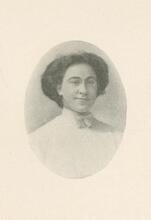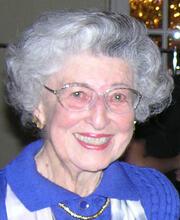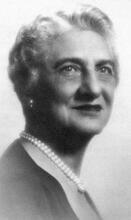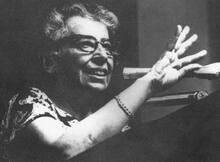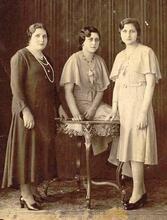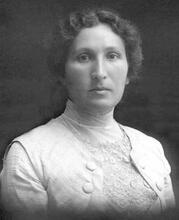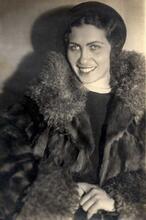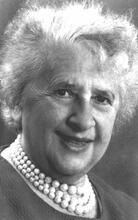Dorothee Metlitzki
The work of German-born historian Dorothee Metlitzki showed the importance of Arab contributions to Western thought and the progression of ideas across the entire expanse of the medieval world. Metlitzki earned her master’s degree from the University College of London in 1938 and then travelled to Palestine alone, teaching at Hebrew University. She regularly crossed the Egyptian border to tend to her dying husband, an Egyptologist. Widowed with a young child, she immigrated to the United States in 1953 and earned her PhD from Yale, where she taught until her death. In 1977 she published The Matter of Araby in Medieval England, demonstrating how Arab philosophers preserved the works of ancient Greek scientists which were then adapted by English thinkers.
Upbringing and Education
Dorothee Metlitzki, a philologist and medievalist, was born to factory owner Israel Metlitzki, a Russian Jew, and Rosa Malbin, a German Jew, on July 27, 1914, in Koningsberg, then in Germany, and spent her youth in various places in Eastern Europe. She received her undergraduate and graduate education at the University College of London (1933–1938) and her Ph.D. from Yale University (1953–1957), with which she was affiliated for many years until her death (1965–2001). She also taught at the Hebrew University of Jerusalem (1939–1944), at the British Council in Cairo and at the University of California at Berkeley (1957–1965).
Metlitzki’s most important work was The Matter of Araby in Medieval England, published in 1977. In this groundbreaking work, which is the finest example of her remarkable philological knowledge, she traces the introduction of Arabic (and essentially Greek) science and ideas into medieval England, and follows the development of these ideas, right up to Chaucer’s Canterbury Tales. She had been fascinated by the medieval world ever since her days as an honors student at the German gymnasium in Memel, Lithuania, in the late 1920s and early 1930s; In her undergraduate as well as graduate work at the University College of London during the 1930s, she studied both English and Arabic literature, in preparation for her later work. At the same time she developed a strong interest in the meeting of East and West and its effects on intellectual history. But though she was a lover of books and considered them her loyal friends, her interests did not remain purely intellectual; a woman of action, she lived for many years in the Middle East, perfecting her various languages and becoming part of the world she described.
Life in the Middle East and Marriages
Indeed Dorothee Metlitzki’s academic pursuits seemed very much to shape and be shaped by her adventurous and often tragic personal life. In 1938, at the age of twenty-four, she left London, having completed her master’s thesis, to go to Palestine alone. As an ardent Zionist as well as a lover of Arabic culture, residing in the Middle East was the fulfillment of a dream for her. She was fortunate enough to arrive there during a time when there was still a train running from Palestine to Egypt. Metlitzki befriended many of the leading lights at the Hebrew University of the time, but she also made many Arab friends. Indeed, while she principally resided in Palestine, later Israel, she also spent several years living and teaching in Cairo. In an incident which seems to capture all the contradictions Metlitzki lived through, she spent many weeks in the summer of 1944 combing the bookstores in Jerusalem for classics in English. She had been charged with buying the books for the English library at the newly established library of Alexandria.
With World War II raging all around, Dorothee Metlitzki’s existence was far from idyllic. And in addition to the terrors of her time which every European Jew experienced, she suffered through many tragedies in her personal life. In 1944 she married the brilliant and charismatic Paul Kraus, an Arabist, but a few months later, separated from her and overcome by memories of previous sorrows, he committed suicide. She then married Egyptologist Boris Grdseloff, Kraus’s friend and equal in brilliance and charisma. From this marriage was born her only child, Ruth. However, Grdseloff developed cancer and Metlizki spent the years after the establishment of the State of Israel in 1948 traveling from Israel to Egypt, an enemy state, to tend to him. He died in a hospital in Egypt in 1950. She spent the next few years using both her excellent Arabic and her excellent English in the service of the Israeli government, working with local Arab women and as a speaker overseas on behalf of the Foreign Ministry. In 1953, longing to return to the academic work which she had neglected, and the sole parent of her young daughter, she moved to New Haven, Connecticut, where she completed her dissertation in the American Studies department of Yale University. There she married Jacob Finklestein, an Assyriologist, with whom she moved to the University of California at Berkeley for a while. This proved to be an unhappy match and ended in divorce.
Legacy
Dorothee Metlitzki taught at Yale for many years, and was famous—as well as controversial—throughout the university. Her intimate acquaintance with cultures far away and long gone, together with her fiery personality, made her stand out. She was beloved by her students and made many extremely devoted friends, to whom she was, in turn, extremely loyal. One of the greatest sources of her sadness, as well as a source of her charm, was that her past was always with her. She was highly conscious of being a woman, alone, struggling for survival and recognition in a man’s world. And not for one minute did she forget that she was Jewish and an ardent Zionist. The fate of her family, as well as her own, was shaped by it. But perhaps more than anything she was aware of not quite belonging. Although fluent in so many languages and living on so many continents, she never quite found her place in the world. When asked where she was from, she did not know how to answer. She very much resembled some of the translators of medieval times about whom she wrote, who traveled from place to place in the pursuit of knowledge and found their homes in their books. She liked to say that one could not separate one’s personal life from one’s scholarly work. That was certainly true about her.
Dorothee Metlizki died on April 14, 2001, in Hamden, Connecticut.
Metlitzki, Dorothee. Curriculum Vitae, exact date unavailable but must be from the 1980s, courtesy of Robert Watson.
Watson, Robert. Notes on Dorothee Metlitzki, 2002, courtesy of Robert Watson.



